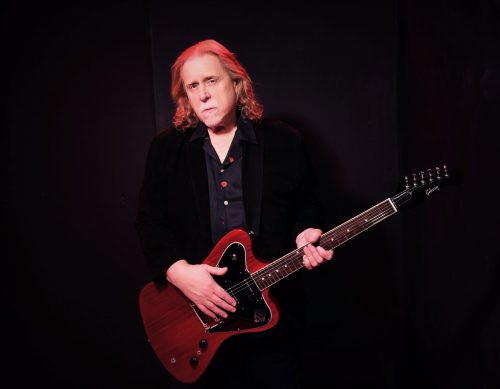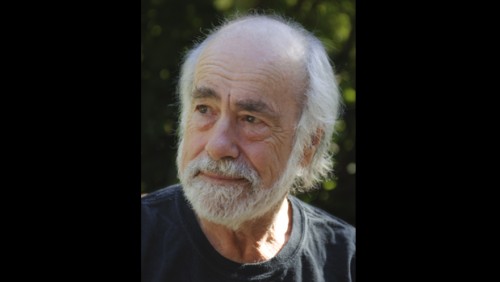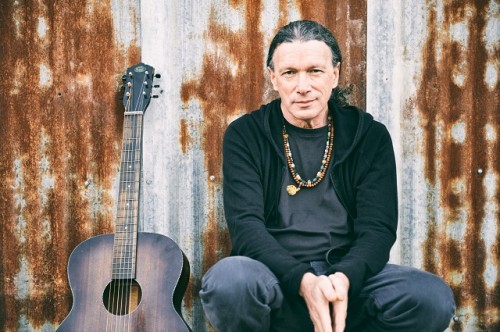In the run-up to his annual New Year’s Eve run with Gov’t Mule at the Beacon Theatre, Warren Haynes had carved out time to release and promote his first solo album in nearly a decade, “Million Voices Whisper.” Instead, he’s doing double duty, also leading a hurricane recovery benefit called Soulshine, named for one his signature songs, at Madison Square Garden this Sunday.
“None of us could ever have predicted the hurricane disaster and that we would be in a position of needing to rally the troops to do this Soulshine benefit, which I’m so happy that people are coming together and so proud of everybody,” said Haynes, an Asheville native, guitarist and vocalist renowned for his work with the Allman Brothers Band and post-Jerry Garcia Grateful Dead projects as well as Gov’t Mule.
“Yeah. There’s a lot going on.”
The jam-packed Soulshine bill includes the Dave Matthews Band, Warren Haynes Band, Nathaniel Rateliff & The Night Sweats and Goose, special guests Trey Anastasio, Mavis Staples, Robert Randolph, Joe Russo, Trombone Shorty, Susan Tedeschi and Trucks, and more to be announced.
“Million Voices Whisper,” No. 1 on Billboard’s blues chart, touches on Haynes’ blend of rock, blues and r&b, with a sense of warmth and soulfulness that recalls the work of Van Morrison and The Band. His new band features on the record: John Medeski on keys, Dirty Dozen Brass Band’s Terrence Higgins on drums and Mule bassist Kevin Scott, along with guests Lukas Nelson, Jamey Johnson and his longtime Allman Brothers guitar partner Derek Trucks. Haynes and Trucks, who ended up playing on several songs, finished composing “Real Real Love,” a tune Haynes initially started writing with Gregg Allman, who died in 2017.
Haynes spoke with us via Zoom about the new album, the benefit, the legacy of the Allman Brothers, more new releases to come and what he learned from Phil Lesh, the Grateful Dead bassist who passed away recently. Highlights from the interview follow, and a video of the full conversation can be viewed at the bottom of the page.
One thing about the record that I’ve enjoyed is there seems to be a real positive vibe to it. I don’t know if that was the way you were feeling when you were writing, or you were trying to put something into the world that maybe you felt was needed.
I feel like in the past five years or so, I’ve kind of turned a corner and started to explore some different approaches to songwriting that I think every songwriter goes through every few years. It started for me at the beginning of the Covid lockdown. You know, I’ve written my share of dark songs through the years, and the last thing I wanted to do was allow that situation to turn me into an even darker place or interpreter. So I just started concentrating on the things that are most important in life and looking through a different lens, and kind of opened a new chapter for me not knowing where it was all going to lead. And it’s carried over through two Gov’t Mule records, and now with this new solo record where I’m glad to be kind of writing about different subject matter, writing philosophically from a different standpoint musically, lyrically, all the way around. I just feel like it’s a beautiful challenge for me as someone who’s been writing songs all my life. It’s very inspiring.
I was shocked that this is the first time you’ve recorded with Derek since “Hittin’ the Note,” the final Allmans album from 2003. Is that true?
We haven’t collaborated to this extent [since then]. I sang harmony on a Tedeschi Trucks Band song that we wrote together since then, and we’ve jammed on stage quite a few times together. But this is the most we’ve collaborated in the studio since “Hittin’ the Note.”
When you and Derek went into the studio, did you automatically each fall into your usual roles, or did you have to map it out and say, I’m going to go this way, you go this way or so forth?
Well, we like to leave things to chance for the most part. We like to see what happens in the moment, which is what happened in the studio here. We had spent three days at his place in Georgia writing songs and then two days in the studio recording. But a lot of the arranging and especially the improvisation happened in the moment. We didn’t know what was going to happen until we got there. As an example, the opening song, “These Changes,” we had written and arranged most of that tune, but that final outro guitar section just happened spontaneously. And we decided to keep it. And the same with the the ending of “Hall of Future Saints.” You know, the ending is longer than the song itself, but that’s just something that happened in the moment. And a lot of people would have said, no, let’s edit that out or fade it quickly or whatever, but I think the fact that the two of us are in the studio together, the people want to hear the unedited version of that, you know? We love walking the tightrope, seeing what happens.
Did you include “Real Real Love” as a bit of a tribute to Gregg and the co-writing work you had done together? Like a chance to write with him again?
Yeah, it was that as well as just making sure that a beautiful, unfinished song came to life. And once that happened, it was kind of the catalyst that got Derek and I back together. You know, I called him and told him about the song and told him that I thought we should record it together. And of course, that conversation led to, well, let’s get together and write some more songs and then let’s get in the studio and record together. So it was a nice organic process, and I’m really glad that we were able to bring that song to fruition.
With you and Derek including Allman Brothers songs in your sets, and Gregg and Dickey Betts’ sons doing the same with their band and the The Allman Betts Family Revival, the band’s music is still out there. Did you expect there to be so much Allman Brothers-related activity in the aftermath of that final show at the Beacon 10 years ago?
You know, that music is so timeless and Derek and I are such fans of the original band. I always say that when I think about the Allman Brothers, I think about the band with Duane Allman and Berry Oakley that was together 1969, ’70 and ’71. And the music that was made later and the music that we made the last 14 years that we were together, I think is timeless music and deserves to be carried into the future, whether it’s by us or by other people. And I think the audience can tell when something has a timeless quality about it. It’s really the audience that brings music back and puts the stamp of approval on it and says, “This music is good to go into the future,” you know? And I guess we’ve all always shared that love of that music and known that that music was classic and timeless, but it’s nice to to see it proven that way. And those songs are flexible and elastic and interpretable. So you can take them into a lot of different places. So you’re not just recreating something that’s already been done. You’re kind of rediscovering or discovering a way of reimagining it, you know?
How did Soulshine come together? Was it a matter of you and Dave Matthews talking about doing it?
You know, I’m from Asheville, North Carolina, and that part of North Carolina got devastated by Hurricane Helene. My family is all still there. Most of my family and close friends had to relocate. They had weeks or months with no water, no power, no cell service. But a lot of people that aren’t in my immediate circle were devastated to the point that it’s going to take years and years to rebuild. So I normally do this benefit concert in Asheville called The Christmas Jam. And I was planning on doing a Christmas Jam this year. And once all this happened, it became obvious that we weren’t going to be able to do it in Asheville. So the mission became how to make the most money, the most impact and raise awareness by doing it somewhere else. So I reached out to the Dave Matthews camp and as it turns out, they have a lot of ties to the Sarasota, Florida, area, which was devastated by two hurricanes back to back. So we were on the same page about doing something like this. So that’s where the idea came about. And of course, everybody volunteered their services right off the bat. All of our friends and people in the music business are just rising to the occasion and contributing, volunteering their services and coming together in an amazing way right now. As I mentioned, the mission for this is just to raise as much money as possible, knowing it is just a drop in the bucket on what what needs to be done.
A lot of all-star shows like this have a long list of performers, but you’re only doing a handful of bands with some special guests. Does this leave room for longer sets and collaboration?
Yeah. I think the idea for this was the performers that we’ve enlisted for this show, people expect a little more lengthy performance and for there to be some stage sharing. Most of these people that are kind enough to be part of this, we all exist in a world where we’ve known each other for a long time. We’ve played on stage together many, many times. And so it’s a family reunion in that way. So everybody will be sharing the stage with everybody, and everybody will be able to do a little longer set than if it were like you mentioned where people do two songs. And again, just the impact, you know, let’s do it with as few artists as possible that we know we can make the impact and raise the money, because that’s really what it’s all about, you know, making amazing music with people that have a likeminded mindset and for people that that share that same musical mindset.
How and why did you start Christmas Jam?
Well, actually, it came about in an odd sort of organic way. The very first Christmas Jam was just a bunch of local musicians getting together in a club and jamming, and at the only time of the year that we were all in town because musicians travel. And this is before I had joined the Allman Brothers. I think the first Christmas Jam was in 1988, and I joined the Allman Brothers in January of ’89. So it’s kind of a weird coincidence, but we were just using it as an excuse to get together and play music and have fun and then, well, what do we do with the money? Let’s donate it to a charity. So we picked a charity. It was successful. We did it again the next year, picked another charity. And once we decided to continue the process, somewhere along the line Habitat for Humanity came into the picture and we really liked working with them. We could see where the money was going, it just clicked. And from that point forward we’ve been working with them. But the first two or three years we’re in a club, then it moved into a theater, then it outgrew the theater after two or three years and moved to the arena where it’s been for over 25 years now. It was really just a natural chain of events because it started local, became regional, then became national, then became international, and it was all opportunity driven. It wasn’t like I was thinking, oh, I want to do some big charity show. It was just like, well, we have the opportunity to do this, we should take advantage of it.
What does it mean to you to do the annual Gov’t Mule shows at the Beacon?
Well, the Beacon is the venue that I’ve played more than any other venue in the world. I think I’ve played there over 300 times, which seems a little crazy. My first Beacon show was 1988 with the Dickey Betts Band. And the opening act was Melissa Etheridge, who had just released her first record. Wow. So I go back with the Beacon for over 20 years now, I guess we’ve been doing Gov’t Mule New Year’s shows there, and they’re very special. It’s a wonderful venue and that audience is fantastic. And it’s turned into this beautiful tradition where we do a thematic show on the 31st, and it’s usually a really long show. And then we usually do two or three nights, all told. I’m excited because Gov’t Mule hasn’t played in a while. So we’re looking forward to getting back into rehearsal and kicking off the dust and doing these shows, then Jamaica [Gov’t Mule’s Island Exodus] and then some shows next year for our 30th anniversary, which is right around the corner.
What’s planned for the 30th anniversary as far as releases? Are there going to be special editions of old records or is there going to be new music coming out?
Yes. Going back to the early trio with myself and Matt Abts and Allen Woody, there’s some studio recordings that have never been released before that I’m really excited to put out for the anniversary. There’s also some live recordings from that era that have never come out that are fantastic. It’s been fun for me to kind of go through the archives and see what’s there. And I’m amazed at how much cool stuff exists, especially from the first record and a little bit from the second and third records. It’s hard to believe it’s been 30 years, but think people will really enjoy this unreleased music.
You put out a very nice post on social media after Phil Lesh, whom you played with for many years in Phil Lesh and Friends, passed. What was Phil like as a bandleader, and what are some things you applied from working for him to your approach as a leader?
I think Phil’s biggest attribute as a bandleader would be his philosophy of how music needs to be not controlled and not controllable. I talked about this in my post. He was the most open-minded musician I’ve ever worked with as far as putting no expectations on the music, no pressure on the music. And specifically on the improvisation. The improvisation was meant to go wherever it was going to go, and he didn’t even like reining it in. If it felt like it was getting chaotic or losing its way, he loved that — it was just part of the journey. I can remember times when I would think the jams were getting a little out of hand, and I would look over and Phil would be almost laughing. He was grinning so hard and having so much fun. And some of that journey and some of the fun is the unknown and seeing if you can go so far that you might not be able to get back, you know? And so it just opened my mind extremely, because I always thought I was an open-minded musician until I met Phil and I was like, wow, he really puts no parameters on it whatsoever, you know? And that was really the most important thing for him is for it to not be delineated and not be contrived.
What else are you working on?
Well, next year we’re going to continue to promote “Million Voices Whisper” with this new band. And we’re also going to do, as I mentioned, some special Gov’t Mule shows for the 30th anniversary. I’m also going to be releasing a live two-CD set with the Asheville Symphony Orchestra that was recorded prior to Covid. The band, along with the symphony for that record, is Oteil Burbridge on bass, Jeff Sipe on drums, John Medeski on keyboards and Greg Osby on saxophone. We recorded two nights at the Thomas Wolfe Auditorium right before Covid and we delayed it till now because it’s kind of a retrospective of my career, there’s Allman Brothers songs, Grateful Dead songs, Gov’t Mule songs, songs from my solo records, but all interpreted with the band and the symphony together, and I feel like it’s a once-in-a lifetime project and I didn’t want it to get lost in the Covid shuffle. So it’s taken till now for it to come out, but I’m very excited about that. I feel like that having each of those catalogs to choose from gave me the ability to only choose songs that I think work really well with an orchestra, because I don’t think most songs do work well with an orchestra. I’ve never been someone that was a fan of just combining an orchestra with pop music, or rock music or jazz or whatever, just for the sake of doing it. I think it’s a song by song basis that makes it work, and there’s so many to choose from between those catalogs that I had access to so many great songs that I’m really excited. I think people are going to get it.




Leave a Reply